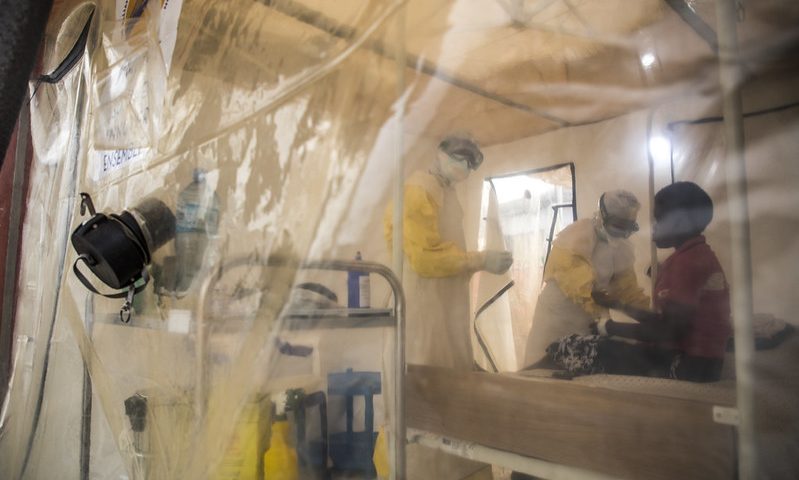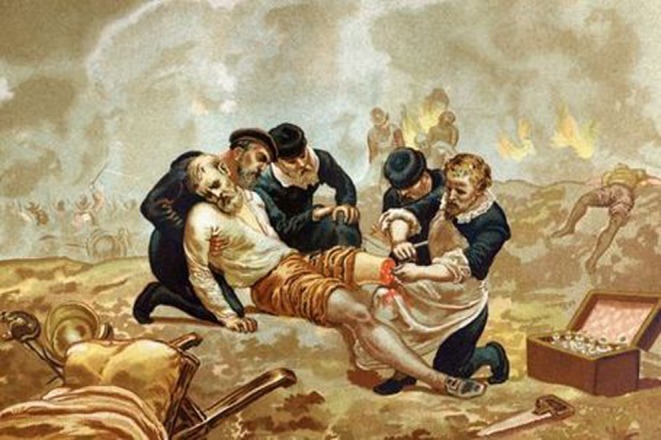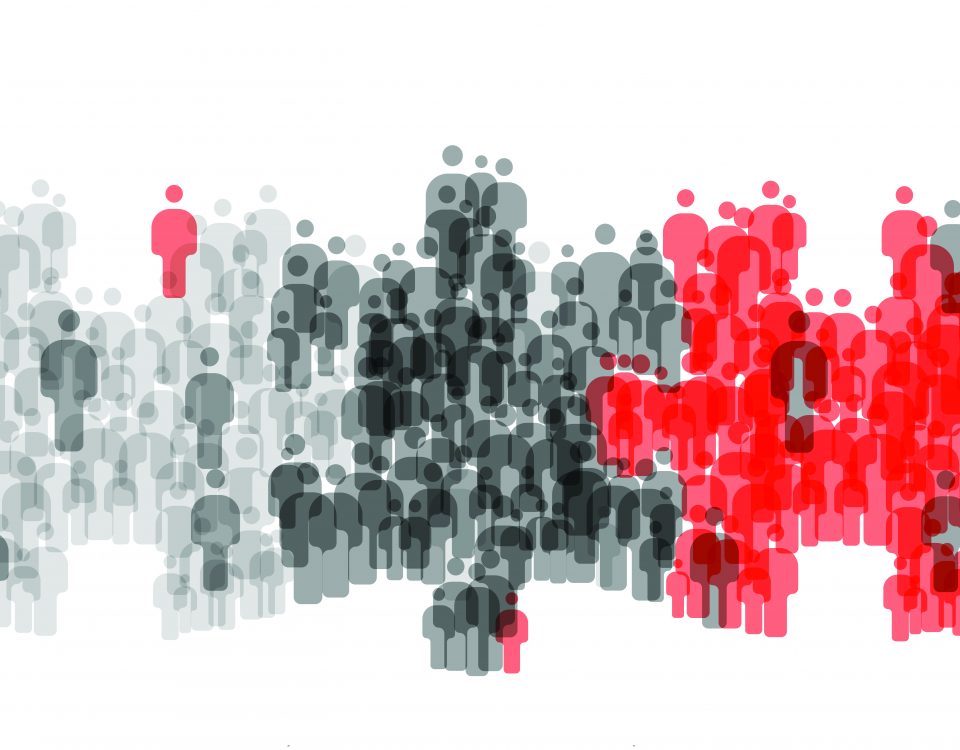


Doping for Work
12 December 2021
Between Drugs and Food: Inventing Microbiota Medicine
12 December 2021By Jules Villa, médialab
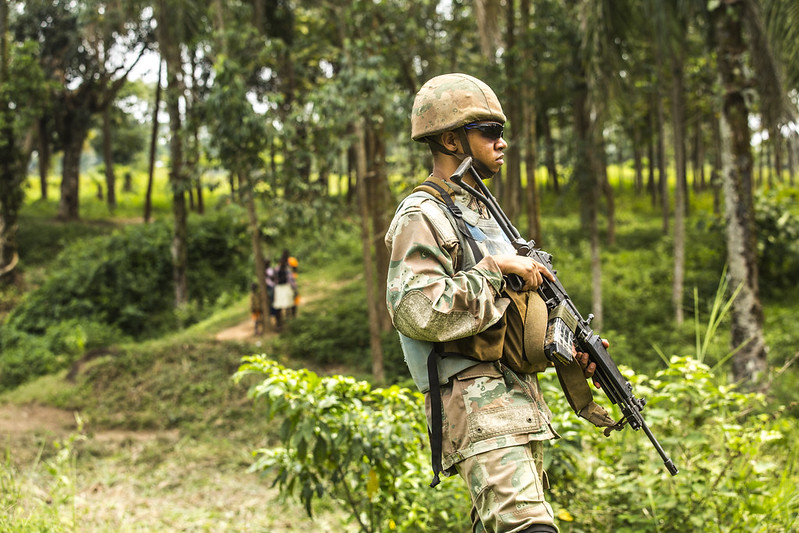
15 January 2019 – Oïcha, North Kivu, Democratic Republic of Congo. World Bank Photo Collection, CC BY-NC-ND 2.0 via Flickr
From 2018 to 2020, an outbreak of Ebola virus disease hit the provinces of North Kivu and Ituri in eastern Democratic Republic of Congo and caused 2,287 deaths.
Media coverage focused on the difficulties that medical teams faced due to insecurity in the region. In addition to the activism of armed groups, they faced violent protests from the local population, who believed that the organisations seeking to assist them had a hidden agenda to harm them. The media story was that conspiracy and collusion theories were the main barriers to gaining the population’s trust.
In his course at the Collège de France, the anthropologist and doctor Didier Fassin suggests eschewing fact-checking these theories and rather to consider them as ‘a window to the world’ providing access to overlooked realities. These accounts might carry a deeper truth than a strictly factual one about the denounced schemes: they could contribute to a better understanding of power relations and inequalities, of relations to science and authority, and of memory of past events.
Luise White, a historian of Africa, wrote similarly about vampire stories. She explains that ‘their very falseness is what gives them meaning; they are a way of talking that encourages a reassessment of everyday experience to address the workings of power and knowledge’(1)White, L. (2000). Speaking with vampires: Rumor and history in colonial Africa. University of California Press. She focuses on these narratives not just as factual information, but to notice that the ways in which they circulate carry a system of truth. Thus, rumours, stories, beliefs and conspiracies related to the practice of medicine in Africa can be understood as a way of talking about the ethical challenges of medical research and the context in which they occur(2)Geissler, P. W., & Pool, R. (2006). Popular concerns about medical research projects in sub-Saharan Africa – a critical voice in debates about medical research ethics. Tropical Medicine and International Health..
Paying attention to the conspiracy theories that have saturated the attention space of this epidemic is more than a choice: it is a necessity. The web of meanings that they outline goes far beyond the disease and brings to the fore power relationships and representations of the self and of the other. What these theories have in common is that they present a perverse gift. Instead of benefiting the recipient, they nurture the giver to the detriment of the receiver.
Below, I examine four of these conspiracies allegedly hatched by powerful people to further their political, economic or organisational interests. To do so, I draw on a series of interviews I conducted between 2019 and 2021 in the region.
1 – ‘Ebola was deliberately planted in the territory of Beni for political purposes.’
Since the early 1990s, the Kivu region has been plagued by great instability: daily life has been shrouded in violence and insecurity for nearly 30 years. Since 2013, the Beni region (North Kivu) has been marred by regular massacres of civilians; the motives are difficult to discern, and the perpetrators are hard to identify – all against a backdrop of resource exploitation and political instability. According to Congolese episcopate figures, more than 6,000 people have been murdered since 2013 without eliciting any decisive political response. Independent investigations have proven that members of the regular army are involved in creating and deepening this insecurity.
In this context, the advent of the Ebola virus in 2018 was interpreted as an additional tool wielded by central authorities to harm a region that had become a stronghold of the opposition. The motive of this plot was supposed to prevent the resistant population from participating in the December 2018 presidential election, which had already been postponed twice since 2016. While schools, markets, and churches remained open, and despite the commitment of health authorities not to disrupt the election, it was ultimately cancelled due to the increased risk of virus transmission then. More than a million people were thus excluded from the electorate in a crucial and long-awaited election.
During the 2006 presidential election, the authorities had already been accused of causing numerous deaths attributable to hidden pacts aiming to secure their victory. Two policemen had been lynched in the Kivu region after being accused of extracting the blood of villagers through the walls of their homes after dark. The story reveals that entry into politics, considered synonymous with rapid enrichment, is associated with the sacrifice of the most vulnerable, as the following example demonstrates even more clearly(3)Geschiere, P. (1997). The Modernity of Witchcraft: politics and the occult in postcolonial Africa. University of Virginia Press..
Indeed, after this election cycle, a second conspiracy started to spread, involving evil individuals seeking to seize local wealth and settle non-native populations in the fertile land of the Beni region. Bearing in mind that a first ‘eviction’ of the population had occurred in this same region during the colonial period under a health pretext (the fight against sleeping sickness) is important to understanding the imagination this rumour tapped into.
2 – ‘The response was for the show, the humanitarians did not want it to stop and were spreading the virus’
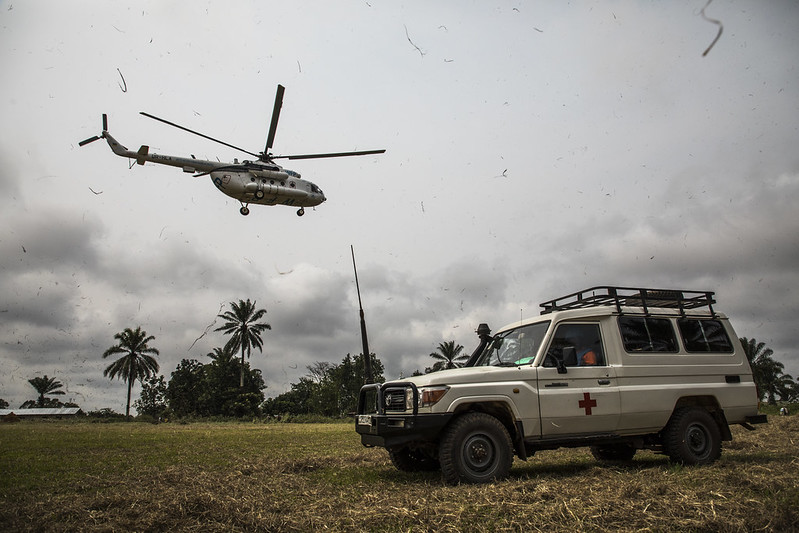
15 January 2019 – OÔcha, north Kivu region, Democratic Republic of Congo. A helicopter from the MONUSCO leaves OÔcha. World Bank Photo Collection, CC BY-NC-ND 2.0 via Flickr
Another narrative was that the people fighting the virus were trying to keep the epidemic going so that they could continue to receive the large financial resources dedicated to their mission. Indeed, luxury vehicles rented for $100 a day, the transportation of equipment, the massive presence of helicopters, and the salaries of expatriate staff were impressive in a region where more than half the people live on less than a dollar a day.
A whole procession of vehicles secured by armed forces would go to the bedside of a single sick person to provide assistance (and sometimes take the person to a health care facility by force). How can this reversal in the economy of attention be understood in a region that has suffered for so long in indifference, and where diseases such as measles and malaria kill far more people than Ebola? What is this disease for which patients are sought while other pathogens kill in indifference? Why are the police and the army suddenly moving into new areas?
This rumour of enrichment raises the question of the interests served by a massive international presence.
3 – ‘Foreigners were suspected of mutilating certain organs to take them to an unknown destination.’
Theories that health interventions serve international organ trafficking or extract reproductive (for women) or sexual (for men) life force are not specific to the Congolese case. But for the latter, they also harkened back to colonialism. Back then stories were told of white cannibals (‘avakota’) taking men away to be ‘swallowed’ by the mines of Teturi or Kilo-moto and never return. The stories can also be linked to a more recent period of mineral and other natural resource exploitation in the region.
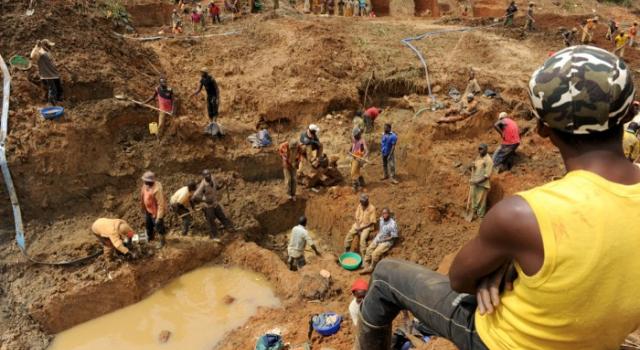
Diggers in a gold mine in Ituri. Source: mediacongo
They describe unequal exchanges in which the Congolese of this region always have more to lose than to gain from the foreign presence.
This story is also a medical one: a randomised clinical trial was set up to determine the most effective treatment and several vaccines were tried even though they had not been approved by health authorities, making it all too clear to the people of Greater North Kivu that their bodies were being experimented on for profit while they would be excluded from any benefits. The memory of a typhoid vaccine trial in the region, in which participants suffered from serious side effects and were never compensated, was marshalled as evidence that the pharmaceutical industry was unfair and inattentive to the most vulnerable.
4 – ‘The mother was giving birth and we were standing there behind the window.’
There was a panic fear associated with the new Ebola Treatment Centers (ETCs), seen as a place from which one could only exit dead.
Instead of denying the validity of this perception, one could consider what health care workers there had to say about it. As physician-anthropologist Paul Farmer notes, ‘There was too little T in the ETU.’ These workers were the first to be shocked by particularly dehumanising care protocols that treated patients as biological threats rather than individuals to save. (4)Farmer, P. (2020). Fevers, feuds, and diamonds: Ebola and the ravages of history. Farrar, Straus and Giroux. They testified to the distress they experienced from biosafety protocols that prohibited them from providing treatment that could relieve pain and greatly increase survival rates without undue risk to caregivers. Powerlessness dominated among them, and accounts of patient abandonment, particularly of women awaiting a caesarean section, paint a picture where patients were more feared than assisted.
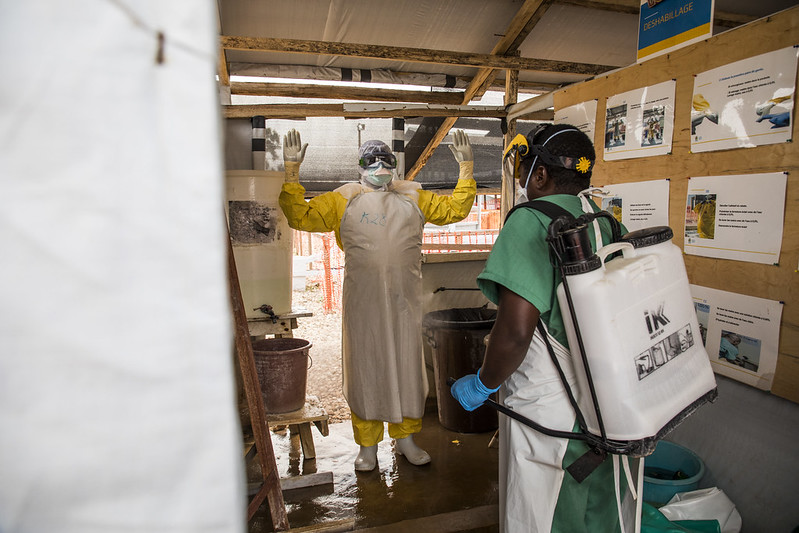
17 January 2019 – Beni, North Kivu region, Democratic Republic of Congo. Dr Ikomo gets disinfected after having been in contact with patients suffering from Ebola. World Bank Photo Collection, CC BY-NC-ND 2.0 via Flickr
In fact, and especially at the beginning of the epidemic, ETCs did not show an exceptional cure rate. Despite official communication highlighting the availability of new treatments, the reality on the ground remained one of infection containment rather than patient treatment. Technological sophistication alone could not make up for decades of lacking medical infrastructure.
In the course of these conspiracy theories allows us to access a discourse on the world. It is a matter of listening to what they have to tell us and studying them as social objects. The relationship of the dominated to power, to the pharmaceutical industry, to neoliberal globalisation, and to the dynamics of global health interventions are thus informed by these stories, as narratives of past and present experience.
In his book Did Greeks believe in their myths? Paul Veyne shows that this question is meaningless. He raises the issue of the status of truth – a word that can only be used in the plural – as the ‘most historical of all’ experiences, since the ways in which truths are created interact with the society that forges them.
The idea is not to embrace a romantic interpretation of these theories, whereby they would essentially be critical discourses expressing what is true and right, allowing the dominated – prevented from otherwise expressing themselves – to make their voice heard and to shed light on forgotten stories. These theories can also be encouraged and spread to serve elite interests, notably commercial and politico-military networks. Hence the imperative to keep a critical eye on these stories: their possibly many essences cannot be determined a priori.
A graduate of Sciences Po and Paris 1, Jules Villa is a doctoral candidate in political science under the supervision of Guillaume Lachenal, a science historian at médialab. Continuing his work on the tenth Ebola epidemic in the Democratic Republic of Congo in North Kivu and Ituri between 2018 and 2020, his dissertation brings together issues related to health and the environment in this region by drawing on field surveys.
Notes
| ↑1 | White, L. (2000). Speaking with vampires: Rumor and history in colonial Africa. University of California Press |
|---|---|
| ↑2 | Geissler, P. W., & Pool, R. (2006). Popular concerns about medical research projects in sub-Saharan Africa – a critical voice in debates about medical research ethics. Tropical Medicine and International Health. |
| ↑3 | Geschiere, P. (1997). The Modernity of Witchcraft: politics and the occult in postcolonial Africa. University of Virginia Press. |
| ↑4 | Farmer, P. (2020). Fevers, feuds, and diamonds: Ebola and the ravages of history. Farrar, Straus and Giroux |

